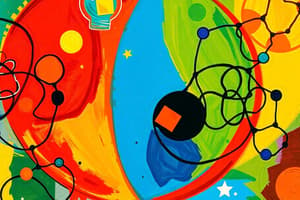Podcast
Questions and Answers
What is the primary focus of physical science?
What is the primary focus of physical science?
- Examining Earth's systems and processes
- Investigating weather patterns and atmospheric phenomena
- Studying living organisms and their interactions
- Exploring energy, motion, and forces (correct)
Which step in the scientific method involves proposing a testable explanation?
Which step in the scientific method involves proposing a testable explanation?
- Observation
- Data Analysis
- Conclusion
- Hypothesis (correct)
What does critical thinking in science primarily involve?
What does critical thinking in science primarily involve?
- Relying solely on established theories
- Making assumptions based on past experiences
- Accepting evidence without questioning
- Evaluation of evidence and arguments (correct)
Which of the following best describes inductive reasoning?
Which of the following best describes inductive reasoning?
What is a primary characteristic of the scientific method?
What is a primary characteristic of the scientific method?
Which aspect of life science could include the study of evolution?
Which aspect of life science could include the study of evolution?
What is the main goal of data analysis in the scientific method?
What is the main goal of data analysis in the scientific method?
Which branch of science focuses on the study of Earth's systems and processes?
Which branch of science focuses on the study of Earth's systems and processes?
Flashcards
What is science?
What is science?
A systematic and logical way to explore the natural world.
What is physical science?
What is physical science?
The study of matter and its properties, including physics and chemistry.
What is life science?
What is life science?
The study of living organisms, including plants, animals, and microorganisms.
What is Earth science?
What is Earth science?
Signup and view all the flashcards
Explain the scientific method
Explain the scientific method
Signup and view all the flashcards
What is inductive reasoning?
What is inductive reasoning?
Signup and view all the flashcards
What is deductive reasoning?
What is deductive reasoning?
Signup and view all the flashcards
How does critical thinking play a role in science?
How does critical thinking play a role in science?
Signup and view all the flashcards
Study Notes
Nature of Science
- Science is a systematic and logical approach to understanding the natural world.
- It relies on observation, experimentation, and data analysis.
- Scientific knowledge is constantly being revised and updated as new evidence emerges.
- The scientific method is a framework for conducting scientific investigations.
- Scientists use various tools and techniques like microscopes, telescopes, and statistical analysis to collect and analyze data.
Branches of Science
- Physical Science: Studies non-living matter, including physics and chemistry.
- Physics explores fundamental concepts like energy, motion, and forces.
- Chemistry investigates the composition, structure, properties, and reactions of matter.
- Life Science: Studies living organisms and their interactions.
- Biology encompasses various fields like cell biology, genetics, ecology, and evolution.
- Focuses on processes like reproduction, growth, metabolism, and adaptation.
- Earth Science: Examines the Earth's systems, including geology, meteorology, and oceanography.
- Geology examines the Earth's composition, structure, and processes.
- Meteorology studies weather patterns and atmospheric phenomena.
- Oceanography investigates the oceans and their properties.
Scientific Method
- Observation: Noticing a phenomenon or pattern in the natural world.
- Question: Formulating a specific question about the observed phenomenon.
- Hypothesis: Proposing a testable explanation for the observed phenomenon.
- Prediction: Formulating a statement that predicts the outcome of an experiment if the hypothesis is correct.
- Experiment: Designing and conducting an experiment to test the prediction.
- Data Analysis: Collecting and analyzing data from the experiment.
- Conclusion: Drawing conclusions based on the data analysis and evaluating whether the hypothesis is supported or rejected.
Scientific Reasoning
- Inductive reasoning: Drawing general conclusions from specific observations.
- Deductive reasoning: Using general principles to make specific predictions.
- Critical thinking: Evaluating evidence and arguments to form judgments. Identifying biases and assumptions, and assessing the validity of sources is essential.
- Skepticism: A questioning attitude, constantly seeking evidence before accepting claims as true.
- Objectivity: Minimizing personal biases and focusing on factual data.
Importance of Science
- Enables understanding of the natural world.
- Drives technological advancement.
- Addresses societal challenges like disease, climate change, and resource management.
- Improves quality of life.
- Inspires curiosity and fosters critical thinking skills.
- Fosters collaboration and communication among scientists.
Scientific Ethics
- Ethical considerations are crucial in scientific research.
- Protecting human subjects and animal welfare is paramount.
- Maintaining objectivity and avoiding bias is essential to scientific integrity.
- Proper and honest record-keeping is a fundamental requirement.
- Disseminating results in a responsible and transparent manner.
- Avoiding plagiarism and conflicts of interest is vital.
- Scientific fraud is unethical and unacceptable.
Studying That Suits You
Use AI to generate personalized quizzes and flashcards to suit your learning preferences.




